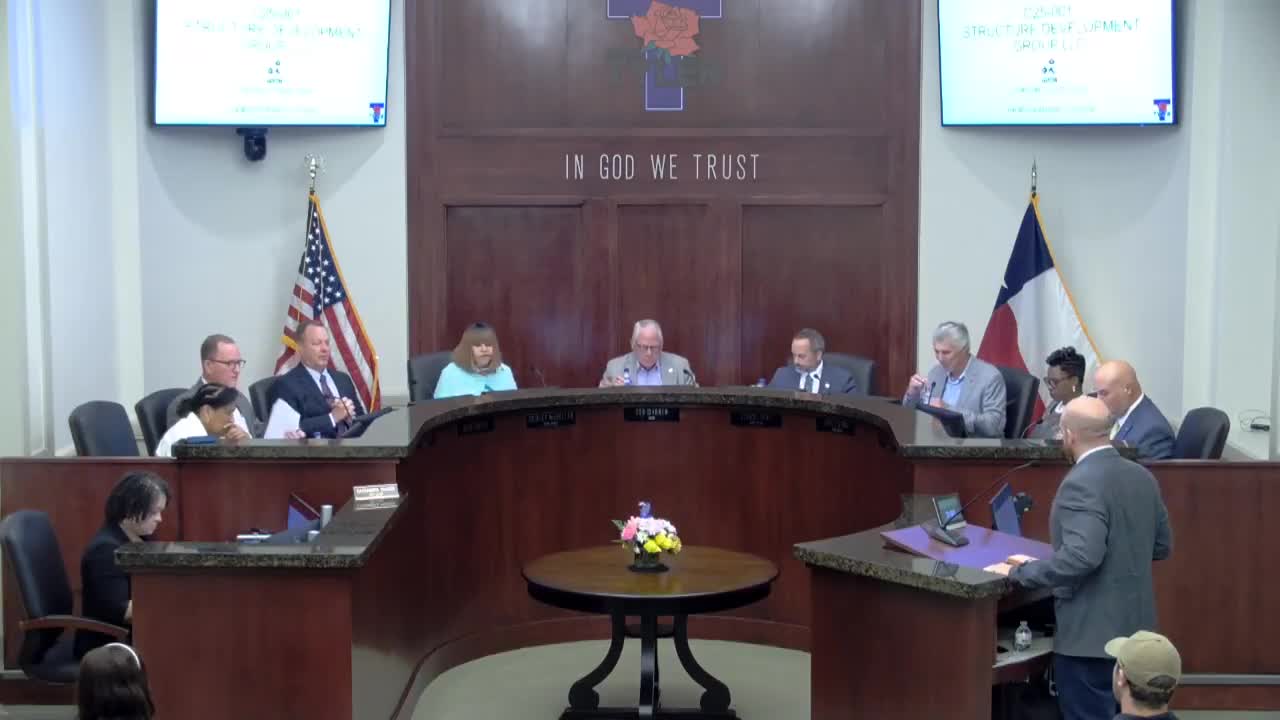Tyler Planning Commission Approves Multiple Zone Changes for Residential Development
May 01, 2025 | Tyler, Smith County, Texas
This article was created by AI summarizing key points discussed. AI makes mistakes, so for full details and context, please refer to the video of the full meeting. Please report any errors so we can fix them. Report an error »

During the City Council meeting held on April 30, 2025, in Tyler, Texas, several significant zoning and thoroughfare closure requests were discussed, reflecting ongoing efforts to adapt the city’s infrastructure and housing landscape.
The meeting commenced with a request for the closure of an undeveloped portion of Rose Street, situated between Bennett Avenue and Boyd Avenue. This area, which has never been constructed, was proposed for abandonment to enhance the buildable area of a nearby lot intended for development. The Planning Commission unanimously recommended approval of this closure, contingent upon the area being replanted within six months. The council voted in favor of the motion, indicating a collective agreement on the necessity of this change to facilitate future development.
Another key topic was a zone change request from Light Commercial District to R1B Single Family Residential District on Burna Street. This area, located northeast of the Gentry Parkway overpass, features a mix of light commercial and residential properties. The applicant aims to develop a single-family home, aligning with the Tyler First future land use guide, which emphasizes increasing residential options in the North End. The council approved this request unanimously, reflecting a commitment to enhancing residential opportunities in the area.
Additionally, a zone change request from R1B to R1D Single Family Attached and Detached Residential District on Chandler Street was presented. This change would allow for the redevelopment of the property with a new single-family home, providing more flexibility in building design due to the lot's irregular shape. The Planning Commission also recommended this change unanimously, and the council supported it, further indicating a trend towards accommodating diverse housing needs.
Overall, the discussions during the meeting highlighted the City Council's proactive approach to urban planning and development, aiming to balance residential growth with existing commercial areas. The unanimous approvals suggest a strong consensus among council members on the importance of adapting zoning regulations to meet the evolving needs of Tyler's community. As these developments progress, they are expected to contribute positively to the city's housing stock and overall urban landscape.
The meeting commenced with a request for the closure of an undeveloped portion of Rose Street, situated between Bennett Avenue and Boyd Avenue. This area, which has never been constructed, was proposed for abandonment to enhance the buildable area of a nearby lot intended for development. The Planning Commission unanimously recommended approval of this closure, contingent upon the area being replanted within six months. The council voted in favor of the motion, indicating a collective agreement on the necessity of this change to facilitate future development.
Another key topic was a zone change request from Light Commercial District to R1B Single Family Residential District on Burna Street. This area, located northeast of the Gentry Parkway overpass, features a mix of light commercial and residential properties. The applicant aims to develop a single-family home, aligning with the Tyler First future land use guide, which emphasizes increasing residential options in the North End. The council approved this request unanimously, reflecting a commitment to enhancing residential opportunities in the area.
Additionally, a zone change request from R1B to R1D Single Family Attached and Detached Residential District on Chandler Street was presented. This change would allow for the redevelopment of the property with a new single-family home, providing more flexibility in building design due to the lot's irregular shape. The Planning Commission also recommended this change unanimously, and the council supported it, further indicating a trend towards accommodating diverse housing needs.
Overall, the discussions during the meeting highlighted the City Council's proactive approach to urban planning and development, aiming to balance residential growth with existing commercial areas. The unanimous approvals suggest a strong consensus among council members on the importance of adapting zoning regulations to meet the evolving needs of Tyler's community. As these developments progress, they are expected to contribute positively to the city's housing stock and overall urban landscape.
View full meeting
This article is based on a recent meeting—watch the full video and explore the complete transcript for deeper insights into the discussion.
View full meeting
